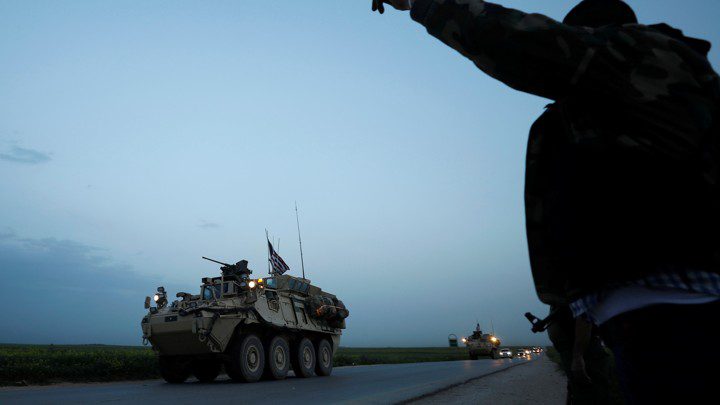Syria’s Collapse and the Resurgence of Türkiye: A Critical Turning Point in Middle Eastern Geopolitics.
The Syrian conflict is rapidly reaching a breaking point, with Bashar al-Assad’s administration teetering on the brink of collapse. The Assad regime, already a shadow of its former self, faces an existential crisis compounded by growing internal dissent, economic devastation, and increasing isolation. As Syria falls apart, the region’s geopolitical landscape is being reshaped, and Türkiye has emerged as a decisive player whose role cannot be ignored.
Türkiye’s Strategic Pushback Against Terrorism
Türkiye’s unyielding stance on its national security has redefined the dynamics in northern Syria and Iraq . Through military operations and its strategic alliance with the Syrian National Army (SNA), Türkiye has neutralized the influence of the CIA backed PKK and its affiliates, the PYD and YPG, which Ankara sees as direct threats to its sovereignty. The Turkish government has been unequivocal: it will not tolerate the establishment of a terrorist PKK PYG YPG group -controlled autonomous region along its border, particularly one backed by the CIA and supported by the same terrorist groups the U.S. and EU have officially designated as such. It should be clearly noted Turkiye has never had a problem with Kurds . Turkiyes number one enemy is the CIA backed PKK, YPG and PYD.
This determination has not only thwarted PKK/ YPG ambitions but has also showcased Türkiye’s ability to reshape the power lines in Syria. According to certain news outlets, Türkiye’s military presence in northern Syria remains vital, ensuring that these groups cannot create a land-grab-style movement that threatens regional stability.
The United States’ Misstep
What is most astonishing in this geopolitical chess game is the United States’ decision to align itself with terrorist organizations that they have labeled as terrorist ( During Senate Armed Services Committee Hearing on combating ISIS, U.S. Senator Lindsey Graham (R-South Carolina) questions Secretary Carter and General Dunford on the U.S. military strategy in working with terrorist PKK and PYG )
https://www.youtube.com/watch?v=kLiVjIv9fdc&t=31s like the PKK and YPG instead of leveraging its NATO ally, Türkiye, the second-largest military power within the alliance. This miscalculation has not only strained U.S.-Türkiye relations but has also weakened Washington’s strategic influence in the Middle East.
The Obama and Biden administrations’ decision to support the Kurdish Autonomous Administration of North and East Syria, controlled by PYG, PYD/PKK elements, represents a failure to prioritize long-term strategic alliances over short-term expediencies. As many news out lets aptly highlights, Türkiye’s resurgence has rewritten the rules of power in the region, pushing back against Iranian and Russian influence while exposing the U.S.’s flawed approach. For 24 years I have said in many of my speeches at Bowling Green Falg raisings “ Indeed, it would be impossible to view Turkiye s geo-graphic situation as anything but strategic , Only a peaceful, stronger, democratic, and secular Turkiye at the table can legitimize U.S and western policies & soft power in the region.”
Let’s look at the Winners and Losers
In the chaos of Syria, Türkiye and Israel have emerged as unlikely beneficiaries. Israel views Türkiye’s role as a linchpin in Syria positively, as it disrupts the “Shiite Crescent” that stretches from Tehran to Beirut. By cutting this axis in half, Türkiye has indirectly bolstered Israel’s security interests. Is why we saw on November 22, 2024 of Israeli, Internal Security Agency Shin Bet Chief Ronen Bar immediately flies to Türkiye underscores an essential truth: Türkiye’s role is indispensable to achieving meaningful progress in the Middle East.
On the other hand, the resistance axis—comprising Assad, Tehran, and Hezbollah—has suffered significant setbacks. With Türkiye controlling key security zones in northern Syria, the balance of power has shifted, further isolating Assad and diminishing Iran’s foothold in the region.
Türkiye: The Key to Stability
Türkiye has consistently stated its commitment to Syria’s territorial integrity, yet its actions have been driven by an unshakable resolve to secure its borders. The Atlantic Council underscores that Türkiye’s military operations are not about territorial ambitions but about ensuring its national security. Türkiye’s presence in northern Syria has not only contained terrorist groups but also prevented Iran and Russia from consolidating power in the region.
This is a clear message: without Türkiye at the table, no viable solution in Syria is possible. Türkiye’s actions have demonstrated that it is the indispensable actor in the region, capable of balancing competing interests while prioritizing its own security and national interests.
A Wake-Up Call for Washington
The U.S. must recognize that its relationship with Türkiye is pivotal to achieving long-term stability in the Middle East. While the damage done under the Obama and Biden administrations cannot be undone overnight, there is room for a recalibrated approach. Under a potential Trump White House, Washington must shift its focus from grand resets to pragmatic cooperation with its NATO ally.
Türkiye’s secular governance, military strength, and strategic location make it an invaluable partner for the U.S. Moving forward, Washington should prioritize rebuilding trust with Ankara by addressing Türkiye’s security concerns and fostering meaningful collaboration on shared goals.
Conclusion
Türkiye’s resurgence has not only pushed back against the PKK/YPG , Russia and Iran but has also reshaped the geopolitical calculus in Syria and Iraq . As the Assad regime collapses , the importance of Türkiye as a stabilizing force and a counterweight to Iranian and Russian ambitions cannot be overstated. The U.S. and Israel must realign its policies, recognizing Türkiye’s critical role in the region, and work towards a future where this indispensable NATO ally is given the respect and partnership it deserves.
Ibrahim Kurtulus
Community Activist


